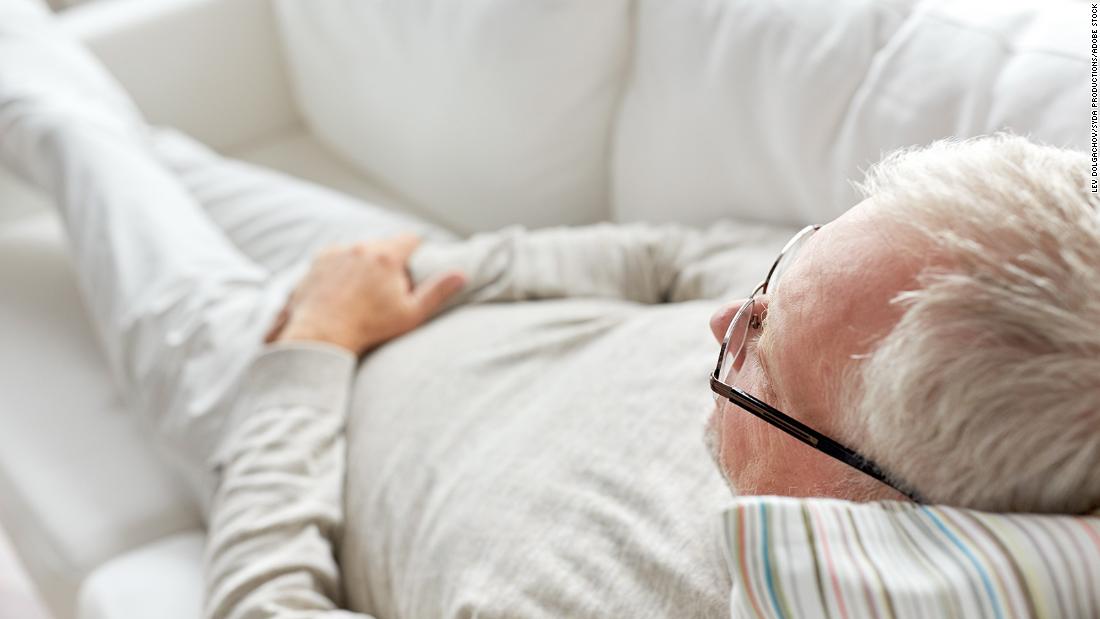Physical activity can prevent dementia, according to a study 0:45
(CNN) --
Napping frequently or regularly for long periods of the day may be a sign of early dementia in older adults, a new study reveals.
Older adults who napped at least once a day or for more than an hour a day were 40% more likely to develop Alzheimer's than those who napped not daily or for less than an hour a day, according to the study published Thursday in the academic journal
Alzheimer's and Dementia: The Journal of the Alzheimer's Association
.
"We found that the association between excessive daytime napping and dementia held after adjusting for nighttime sleep quantity and quality," said study co-author Dr. Yue Leng, an assistant professor of psychiatry at the University of California in San Francisco in a statement.
The results are consistent with the conclusions of an earlier study by Leng, which found that napping two hours a day increased the risk of cognitive decline compared to napping less than 30 minutes a day.
The new study used data collected over 14 years by the Rush Memory and Aging Project, which followed more than 1,400 people between the ages of 74 and 88 (median age 81).
"I think the public is not aware that Alzheimer's is a brain disease that often causes changes in mood and sleep behavior," said Dr. Richard Isaacson, director of the Alzheimer's Prevention Clinic in the Center for Brain Health at Florida Atlantic University Schmidt School of Medicine.
advertising
"Excessive napping can be one of many signs that a person may be on the path to cognitive decline, and may require an in-person evaluation with a doctor," said Isaacson, who was not involved in the study.
These are 7 ways to reduce the risk of Alzheimer's 1:06
Increased need to nap
The quality and quantity of sleep decline with age, often due to pain or complications from chronic illness, such as the need to go to the bathroom more often.
As a result, older people tend to nap more often than when they were younger.
But daytime naps may also be a sign of brain changes that are "independent of nighttime sleep," Leng said.
Leng pointed to earlier research suggesting that the development of tau tangles, a hallmark of Alzheimer's, may be affecting wake-promoting neurons in key areas of the brain, thereby disrupting sleep.
For 14 days a year, participants in the current study wore a tracker that captured data on their movements.
The absence of movement for a prolonged period between 9 am and 7 pm was interpreted as a nap.
Although people may have been reading or watching TV, "we've developed a unique algorithm to define naps and differentiate them from no activity. We didn't define a specific duration for 'long nap,' but instead focused more on cumulative nap minutes per day and the change in nap length over the years," Leng told CNN by email.
Sleep Apnea and Snoring: 8 Warning Signs to Watch Out For
"This justifies the need for further studies with devices capable of differentiating between sleep and sedentary behavior," Isaacson said.
"But at the same time, being sedentary and not moving for long periods is a known risk factor for cognitive decline and Alzheimer's."
"Regardless of the reason, falling asleep during the day or excessive napping makes me focus on whether the person may be at increased risk for Alzheimer's disease or cognitive decline," he said.
Over 14 years, the study found that daily daytime naps increased by an average of 11 minutes per year in adults who did not develop cognitive decline.
However, the diagnosis of mild cognitive impairment doubled the nap time to a total of 24 minutes a day.
People diagnosed with Alzheimer's nearly tripled their nap time, to an average of 68 minutes a day.
The "drastic increase" in the length and frequency of naps over the years seems to be an especially important sign, Leng said.
"I don't think we have enough evidence to draw conclusions about a causal relationship, that napping itself is causing cognitive aging, but excessive daytime napping could be a sign of accelerated aging or the cognitive aging process," he said.
Covid-19 is linked to cognitive decline and acceleration of Alzheimer's symptoms, according to research
To do?
Adults should preferably limit daytime naps to 15 to 20 minutes before 3 p.m. to get the most benefits from napping and not impair nighttime sleep, Leng said.
In addition, older adults and caregivers of people with Alzheimer's disease should pay more attention to daytime napping behaviors and watch for signs of excessive or increased napping, he said.
12 questions and answers about sleep: Do you have a sleep deficit?
What causes insomnia?
Is it good to take a nap?
Any significant increase in napping should be discussed with a doctor, Isaacson said.
"I think it's never too late for someone to make a brain-healthy lifestyle change or pay more attention to their brain health," Isaacson said.
"Making sleep a priority, paying attention to sleep quality, and talking to your doctor about sleep — all of these things are critical."
sleep quality dementia






